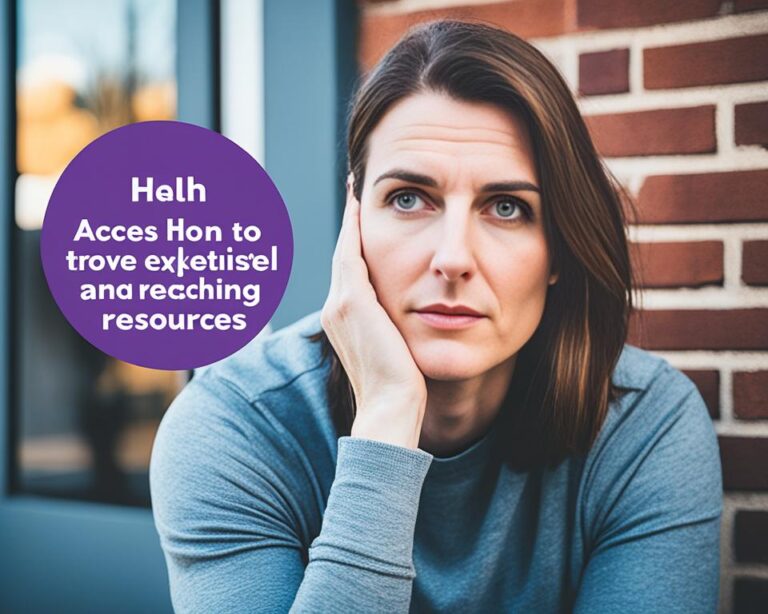Chronic stress can negatively affect both your body and mind. The National Institute of Mental Health identifies stress as a natural reaction to life’s demands. Yet, studies indicate that mindfulness can lower stress and boost well-being.
Mindfulness means living in the now and concentrating on present experiences. This practice, when part of your daily life, can control stress and better your life quality.
Key Takeaways:
- Practicing mindfulness can help reduce stress levels and improve overall well-being.
- Mindfulness involves being present in the moment and focusing on current experiences.
- Incorporating mindfulness techniques into your daily routine can enhance stress management.
- Mindfulness can improve your ability to cope with stress, reduce anxiety and depression symptoms, and improve your overall mood.
- Mindfulness exercises such as breathing techniques, self-compassion, and connecting with nature can promote relaxation and a sense of calm.
Understanding the Effects of Stress on the Body
Prolonged or chronic stress significantly affects your health. The body’s fight-or-flight response is meant for immediate danger. But, when stress persists, it harms both physical and mental health.
Chronic stress can lead to high blood pressure, heart disease, and mental health issues. These conditions severely affect life quality.
Avoidance coping or distractions might seem helpful, yet they’re harmful long-term. Building stress resilience and coping strategies are essential for managing stress impacts.
Practicing mindfulness is a way to build resilience. It focuses on being present and attentive to current experiences. This technique improves well-being by enhancing your stress response.
Mindfulness boosts your confidence in managing stress. Being fully present helps you react according to your values and goals.
Mindfulness reduces distress and enhances resilience. It strengthens your ability to tackle stress healthily.
“The stress response is natural. Yet, our response to stress shapes its health impact.”
Mindfulness and resilience come from acknowledging feelings without judgment. This awareness helps identify stress triggers. Then, you can make informed decisions on handling them.
By focusing on the present, you realize your options and values. This focus boosts resilience and helps manage life’s hurdles. Mindfulness leads to healthier coping and less distress.

Mindfulness Practices for Stress Reduction
If you’re looking for ways to lower stress, try adding mindfulness to your daily life. Mindfulness means being fully in the moment and observing your thoughts and feelings without judgment. This approach can boost your well-being and help manage stress effectively.
Breathing Exercises
Deep breathing is a simple mindfulness method. It triggers the body’s relaxation response, lowering heart rate and blood pressure. Settle into a comfy spot and pay attention to your breath’s flow. Experiment with methods like diaphragmatic breathing or box breathing, where you follow a specific sequence of inhalation and exhalation.
Self-Compassion
Self-compassion is critical for stress relief and nurturing a positive outlook. It’s about being kind and understanding to yourself, especially in tough times. Remind yourself that mistakes and setbacks are universal. Treat yourself with the same kindness you’d offer a friend needing support.
Fostering Genuine Connection
Feeling lonely or isolated can increase stress. Building real connections with others can give you a sense of community and support. Reach out to friends, have meaningful interactions, and participate in activities that strengthen relationships. Showing compassion to others and developing personal bonds can improve your well-being and decrease stress.
Meditation and Guided Meditation
Meditation is an effective way to find calm and lower stress. Choose a quiet spot, close your eyes, and concentrate on your breathing or a specific focal point. Let thoughts pass without getting attached. For starters, guided meditation offers structured audio instructions. Apps like “Headspace” or “Calm” provide various guided sessions tailored to your needs.
Stretching
Stretching can serve as a mindfulness practice too, aiding stress reduction. While stretching, focus on how your body feels, the muscle stretches, and how your breathing syncs with your movement. It eases physical tension and fosters mental relaxation and present-moment awareness.

“Mindfulness is the key to unlock your true potential, discover the peace within, and foster genuine connections with yourself and others.”
Integrating these mindfulness practices into your routine can significantly reduce stress, enhance calmness, and boost overall health. Discover the techniques that click with you and practice them regularly. Remember, mindfulness grows stronger with time and practice.
Incorporating Mindfulness into Daily Activities
Mindfulness isn’t just quiet meditation. It’s something you can weave into your daily life, boosting your well-being. By being mindful in routine tasks, you foster presence and peace. Below, explore ways to blend mindfulness into your day:
1. Swimming

While swimming, cherish the experience. Notice how your body feels in the water, its lightness, and the rhythm of your movements. Pay close attention to your breath, taking deep, intentional breaths. Let the water’s calming effect fill you, grounding you in the now.
2. Meditative Walking
Step away from daily chaos and practice walking meditation. Focus on each step, the earth under your feet. Feel your body’s sensations and your breath’s rhythm. Use all senses to take in your surroundings. Let nature refresh your spirit, enriching your soul.
3. Drinking Tea Mindfully
Enjoy a cup of tea mindfully. Relish each sip. Pay attention to the tea’s colors, scents, and tastes. Release distractions, immerse in the moment. This practice slows you down, anchors you in the present, and brings calmness.
4. Connecting with Nature
Nature is a splendid setting for mindfulness. Whether hiking, strolling in a park, or sitting under a tree, nature is serene. Disconnect from tech and dive into nature’s beauty. Listen to birds, feel the breeze, and admire nature’s vistas and fragrances.
5. Gazing Meditation
“When you look at the sky, you become the sky.” – Thich Nhat Hanh
Gazing meditation involves steady focus on something outside yourself, like a candle flame. Find a calm area, pick an intriguing object, and soften your gaze. Let thoughts fade and be fully present. This meditation boosts focus, peace, and connection.
6. Guided Meditation Apps
- Headspace
- Calm
- The Mindfulness App
- Insight Timer
Guided meditation apps can enhance your mindfulness practice. They offer diverse meditations for stress, sleep, and self-kindness. Explore various apps to find your match.
7. Daily Stretching and Breathing Techniques
Add stretching and breathing to your daily routine for mindfulness. Stretch your body, tuning into muscle and joint sensations. Pair stretches with deep breaths, inhaling and exhaling smoothly. This mindful movement and breathing relieve stress and connect you to the present.
8. Mindful Mind-Wandering
“Don’t worry if you find yourself constantly wandering away from the present moment. That is the mind’s natural tendency. Simply keep bringing it back gently, without judgment.” – Jon Kabat-Zinn
Mindfulness isn’t about stopping thoughts or achieving silent mind. Let thoughts drift but gently return to now when you stray. Accept your thoughts’ flow without harsh judgment. This mindful wandering fosters a flexible, kind relationship with your mind.
Mindfulness transcends formal practice. It can enrich all life aspects, from simple to grand. Embrace the now’s beauty and experience mindfulness’s transformative impact in your everyday life.
The Benefits of Mindfulness for Health and Well-being
Research demonstrates the vast benefits of mindfulness for physical and mental health. By integrating mindfulness into daily life, you can achieve significant improvements. These contribute to a more balanced, fulfilling existence.
Mood Improvement
Mindfulness significantly boosts mood. It’s proven to lessen depression and anxiety symptoms, leading to a brighter life perspective. Mindfulness fosters present-moment awareness and acceptance, easing the navigation through tough emotions. This process allows for inner tranquility.
Stress Reduction
Known for stress reduction, mindfulness improves handling of stress’s health impacts. Deep breathing and self-compassion, key mindfulness skills, build resilience. They enable calmer reactions to stress, enhancing well-being.
Pain Management
Research indicates that mindfulness aids in pain management. A non-judgmental, accepting stance towards pain decreases its severity and distress. Mindfulness techniques help manage pain sensations without feeling overwhelmed. This approach enhances comfort.
Improved Brain Functions
Mindfulness benefits brain functions, boosting attention and memory. Regular mindfulness exercises enhance focus and cognitive performance. Improved mental clarity from this awareness benefits work and personal relations.
Weight Management
Mindful eating aids in weight management. It involves attention to hunger and fullness, preventing overeating. This mindfulness fosters a healthier approach to eating, aligning with your body’s needs.
Incorporating mindfulness into your life offers vast health benefits. It helps with mood, stress, pain, brain function, and weight management. Explore different mindfulness practices to transform your well-being.
Resources for Practicing Mindfulness
Incorporating mindfulness into daily routines boosts well-being and stress management. Various resources offer guidance to cultivate mindfulness effectively in one’s life. Explore these tools to significantly enhance your journey to mindfulness.
Guided Meditations
Mindfulness-Based Stress Reduction (MBSR) is a program created by Jon Kabat-Zinn. It provides audio-guided meditations, aiding beginners and those seeking structured practices. These recordings guide focusing and cultivating present awareness.
Mindfulness Courses
For structured and guided learning, online courses are beneficial. Palouse Mindfulness is a free course offering guided mindfulness instruction. It supports learning and integrating mindfulness into daily routines. Additionally, in-person courses at local libraries, community centers, or hospitals create a supportive learning environment.
Mindfulness Apps
Smartphone apps have made mindfulness more accessible. Headspace, Simply Being, and The Mindfulness App offer practices for any setting. Guided meditations, breathing exercises, and techniques from these apps support daily mindfulness engagement, enhancing convenience.
Recommended Books
Books provide deep insights into mindfulness. Jon Kabat-Zinn’s notable works include “Mindfulness for Beginners” and “Full Catastrophe Living.” They offer practical guidance, enhancing understanding and support in mindfulness practices.

Mindfulness profoundly improves well-being and stress management. Guided meditations, courses, apps, and books offer support on this journey. Explore these resources to discover what suits you best, and set out on a path of greater awareness and self-discovery.
Conclusion
Here’s the essence of it! Injecting mindfulness into your day can help control stress and boost your well-being. Techniques like deep breathing, embracing self-compassion, and engaging with the natural world can bring relaxation. They also instill peace in our hectic lives.
Mindfulness transcends being a mere trend; it’s a cultivable ability. Making it a staple in your routine allows you to unlock its stress-busting and life-quality enhancing advantages. So, what stops you from starting today?
With a single deep breath, seek a tranquil spot to begin your journey towards self-discovery and managing stress. By weaving mindfulness into your everyday tasks, observe the uplift in your stress-handling capabilities and overall mood. Kick off with modest steps, evolving your mindfulness practice gradually. Witness your stress dissolve and your overall happiness take flight.

